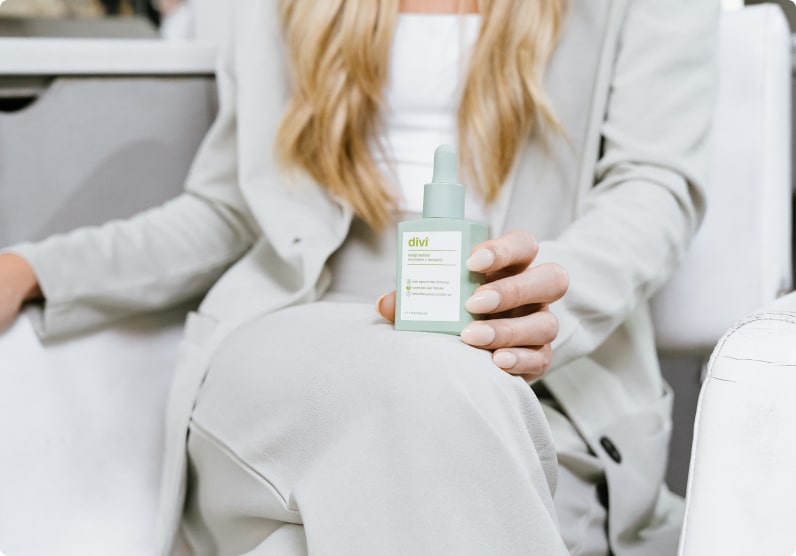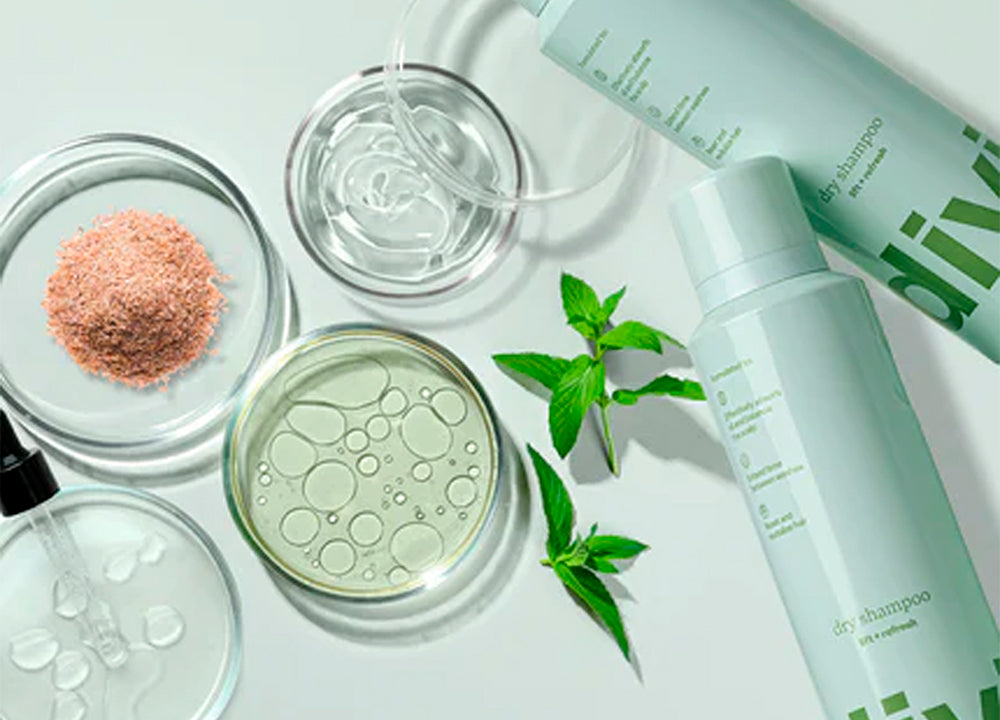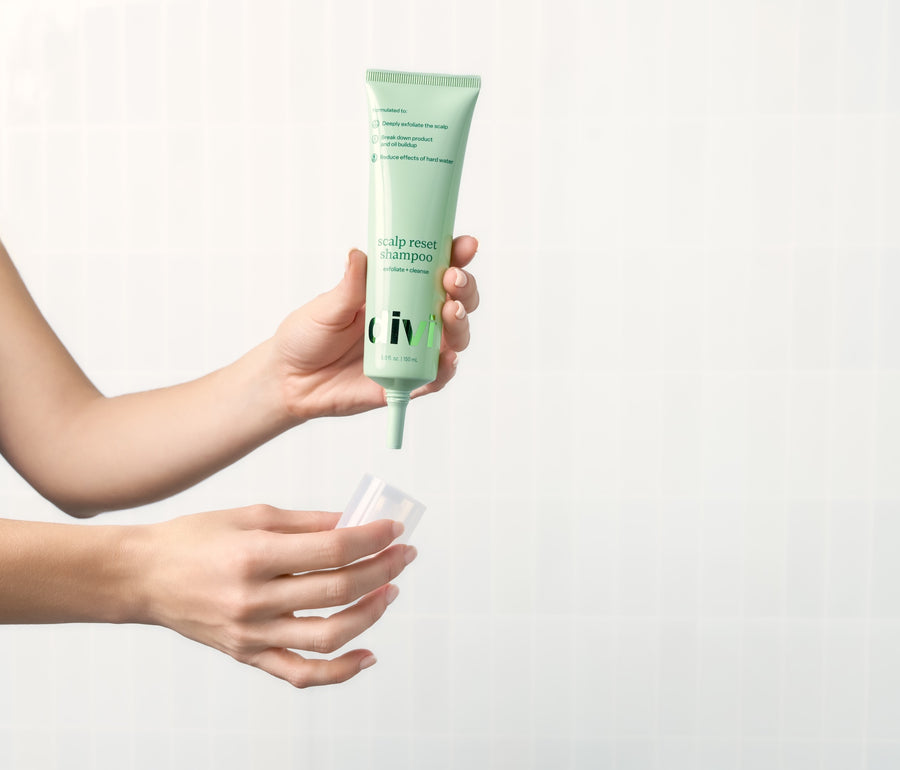Given its increased popularity in recent years, you’ve likely heard of tea tree oil in the context of complementary and alternative medicine. It has a multitude of uses, including promoting a healthy environment for hair growth, which is why tea tree oil is one of the key ingredients in several of Divi’s products.
Here’s a closer look at how tea tree oil may contribute to hair and scalp health.
What is Tea Tree Oil?
Tea tree oil, or melaleuca oil, is an essential oil derived from the leaves of the Australian tea tree. People primarily seek it out for its antibacterial properties. It is often used in skincare and hair care products, and it may be found in treatments for conditions such as acne, athlete’s foot and dandruff. While it offers a myriad of benefits in its topical application, tea tree oil should not be consumed orally, as it is toxic.
How Does Tea Tree Oil Support Scalp Health?
Tea tree oil supports scalp health by killing the underlying causes of dandruff, such as yeast and bacteria on the skin’s scalp, which may cause flakiness or itchiness. Tea tree oil also helps effectively cleanse buildup from both the scalp and hair roots, which is crucial in helping to mitigate excessive oil production. This is especially good news for people with hair and scalp conditions. Since tea tree oil helps promote a well-balanced and rejuvenated scalp, it may contribute to overall hair health and vibrance.
How Can Tea Tree Oil Aid in Hair Growth?
Supports Hair Follicles
Reducing inflammation is essential for fostering hair follicle health. The antimicrobial, antioxidant and anti-inflammatory properties of tea tree oil may aid in relieving the redness, itching and pain associated with scalp conditions. Since it works to reduce any scalp buildup, it also contributes to the unclogging hair follicles impeded by hair product accumulation or other residue, as well as excess oils.
Fights Itchiness and Flakiness
In hair care products like shampoos, tea tree oil is often combined with other ingredients to help soothe the scalp and provide nutrients that may reduce itching and flaking. Consequently, this clean ingredient may be included in solutions intended to lessen symptoms of dry scalp, scalp psoriasis, and other skin irritations. For example, one way it may help ease dandruff symptoms is by deterring the growth of yeast. By unblocking the pores, tea tree oil also helps mitigate the potential for dandruff formation and may also help strengthen the hair roots.
Mixing tea tree oil with other essential oils, such as eucalyptus oil and rosemary leaf extract, may further enhance the benefits of this ingredient. Both tea tree oil and rosemary leaf extract work to foster an environment conducive to healthy hair. Eucalyptus oil also helps stimulate blood flow and circulation, aid in oil control and production and has been found to be an effective antimicrobial agent.
Helps Reduce Product and Oil Buildup
This buildup may stem from a variety of sources. It can come from the natural oils of the body as well as the types of products applied to the hair and scalp. Other scalp conditions may also contribute to oily or greasy hair. Tea tree oil can help regulate oil production on the scalp by targeting root causes on the scalp and hair follicle.
Promotes New Hair Growth
A healthy scalp is crucial in aiding against hair loss and promoting hair growth. For its positive impacts on scalp health, tea tree oil helps facilitate a healthy environment for hair growth.

Are there any Potential Side Effects of Tea Tree Oil?
Tea tree oil has been used by individuals with a variety of hair types and hair conditions. In addition to avoiding ingesting tea tree oil, it should be used cautiously, as it can have some side effects and has been known to cause an allergic reaction in some individuals. Consult with your health care providers, like primary care physicians and dermatologists, if you have any hair or scalp concerns or if you are unsure how specific ingredients may interact with your current medications or health considerations.
Tea tree oil in conjunction with other nutrients may help nourish the scalp, improve the appearance of hair and generally support overall hair and scalp health. To achieve your happy, healthy hair goals, thoughtful food choices, hydration and a comprehensive hair care routine are also essential. Interested in discovering how hair care products that incorporate tea tree oil and other science-backed ingredients may work for you? Try Divi’s Scalp Serum or our Starter Bundle, which includes our Scalp Serum, our Shampoo and our Conditioner!











































 Scalp Serum
Scalp Serum
 Scalp Reset Shampoo
Scalp Reset Shampoo
 Dry Shampoo
Dry Shampoo
 Best Sellers Bundle
Best Sellers Bundle
 Weekly Reset Duo
Weekly Reset Duo
 Root Touch Up
Root Touch Up
 Strand Plumping Styling Cream
Strand Plumping Styling Cream
 Root Reset Duo
Root Reset Duo
 3-in-1 Leave-In Conditioner
3-in-1 Leave-In Conditioner
 Air Dry Cream
Air Dry Cream
 Wash Day Essentials
Wash Day Essentials
 Frizz-Fighting Trio
Frizz-Fighting Trio
 Home & Away Dry Shampoo Bundle
Home & Away Dry Shampoo Bundle
 Volumizing Shampoo & Conditioner
Volumizing Shampoo & Conditioner
 Jumbo Volumizing Shampoo & Conditioner
Jumbo Volumizing Shampoo & Conditioner
 Volumizing Starter Bundle
Volumizing Starter Bundle
 Major Volume Bundle
Major Volume Bundle
 Volume Rescue Trio
Volume Rescue Trio
 Hydrating Shampoo & Conditioner
Hydrating Shampoo & Conditioner
 Whipped Repair Treatment Mask
Whipped Repair Treatment Mask
 Hydrating Starter Bundle
Hydrating Starter Bundle
 Hydration Heroes
Hydration Heroes
 Travel-Sized Volume Duo
Travel-Sized Volume Duo
 Travel-Sized Hydrating Duo
Travel-Sized Hydrating Duo
 Divi's Discovery Set
Divi's Discovery Set
